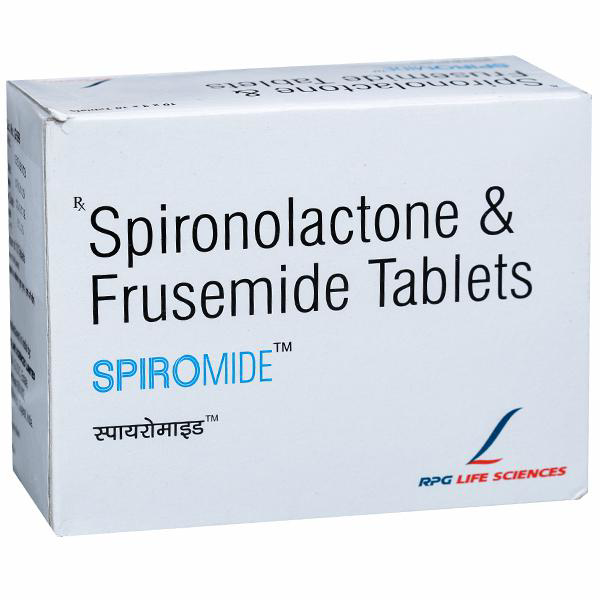Spiromide Tablet
$11.00 $8.00
Spiromide Tablet 10S

Description
SPIROMIDE contains combination called Spironolactone and Furosemide
Frusemide works by causing the kidneys to increase the amount of salts, such as potassium and sodium, which are filtered out of the blood and into the urine
Spironolactone works by blocking the actions of a hormone in the body called aldosterone
WHAT SPIROMIDE IS USED FOR?
It is used in the management of,
Congestive heart failure
Fluid retention (ascites and oedema) in liver cirrhosis
Overproduction of aldosterone, a steroid hormone which regulates the salt and water balance in the body (hyperaldosteronism)
Excess fluid retention causing swelling (oedema)
WARNING AND PRECAUTIONS:
TALK TO DOCTOR
Talk to your doctor before taking this medicine, if you:
Are allergic to furosemide, spironolactone or any of the other ingredients in the medicine
Have decreased liver or kidney function
Have enlarged prostate gland(men)
Have diabetes
Have low blood pressure (hypotension)
Have low volume of circulating blood (hypovolaemia)
Have very high levels of potassium in the blood (hypokalaemia)
Have very low levels of sodium in the blood (hyponatraemia)
Have inadequate production of natural steroid hormones by the adrenal glands (Addisons disease)
PREGNANCY & BREAST FEEDING
Consult your doctor if you are pregnant, planning to get pregnant or breast-feeding, before taking this medicine
DRIVING & USING MACHINES
This medicine may cause fatigue and dizziness. You should take care when driving or operating machinery
INTERACTIONS:
Tell your doctor if you are taking:
Medicines used for hypertension (enalapril, propranolol, verapamil, nitrates, losartan)
Non-steroidal anti-inflammatory drugs (NSAIDs) such as aspirin, indomethacin, mefenamic acid or ibuprofen
Potassium supplements
Heparin or low molecular weight heparin (medicines used to prevent blood clots)
Medicines known to cause hyperkalaemia (raised blood potassium levels)
Trimethoprim and trimethoprim-sulfamethoxazole
Chlorpromazine, temazepam, diazepam, MAOI antidepressants, medicines for mental problems
Medicines used for parkinsons disease (bromocriptine, apomorphine, levodopa
Medicine used for arrhythmias (e.g. sotalol, amiodarone, flecanide)
Digoxin for your heart
Moxisylte for Raynaud?s syndrome
Nitrates (for angina)
Lithium for depression or mania
Sucralfate for stomach ulcers
Colestyramine or colestipol for high cholesterol
Amphoterecin (to treat fungal infections)
Chloral hydrate (to treat insomnia)
Medicines to control diabetes such as insulin or tablets
Antiepileptics e.g. phenytoin or carbamazepine
Corticosteroids or antihistamines (to treat allergic reactions)
Aldesleukin medicines for treating cancer
Levodopa (for Parkinson?s disease)
Oral contraceptives
Alprostadil for erectile dysfunction
DIRECTIONS & FOR USE:
Always take this medicine exactly as your doctor has told you
Swallow the tablet with a glass of water
SPIROMIDE should be taken with food
If you take more SPIROMIDE
If you take more SPIROMIDE, contact a doctor or your nearest hospital casualty department immediately
If you forget to take SPIROMIDE
If you forget to take a dose, take another as soon as you remember. Then take your next dose at the normal time
Do not take double the amount to make up for a forgotten dose
If you stop taking SPIROMIDE
Do not stop taking SPIROMIDE unless told by your doctor
SIDE EFFECTS OF SPIROMIDE:
SERIOUS
Severe allergic reaction which may include a skin rash, itching, dermatitis, peeling skin, sensitivity to sunlight or sun lamps or fever, swelling of the face, lips, tongue or throat or difficulty breathing or swallowing
Low blood volume (hypovolemia)
Increased creatinine and blood urea (seen in blood tests)
COMMON
Increased production of urine
Disturbances of the gut such as diarrhea, constipation, nausea, vomiting or abdominal pain
Dehydration
Decrease in blood pressure
Dizziness, drowsiness, weakness, dry mouth, headache
Confusion, visual disturbances
Muscle cramps
Skin rashes
Increased blood sugar level
Increased level of uric acid in the blood (hyperuricemia) which may cause gout.
Disturbances in the levels of electrolytes (e.g potassium, calcium, magnesium) in the blood
Sensation of ringing or other noise in the ears (tinnitus)
Abnormal enlargement of breasts in men (gynecomastia)
Disturbance in the normal numbers of blood cells in the blood
Severe blistering skin reactions
UNCOMMON
Anemia causing tiredness, breathlessness, unusual bleeding or bruising
Changes in the body seen in tests such as levels of cholesterol, glucose, uric acid
Gout
Changes in vision including blurred or yellow vision
Light-headedness, sensations of pressure in the head, headache, drowsiness, weakness, changes in vision, dry mouth, dizziness when standing
Irregular heartbeat
Muscle cramps or weakness
Changes in the amount or need to urinate
Tiredness
Dry mouth, thirst, feeling or being sick, changes in bowel movements including diarrhea and constipation
Deafness (sometimes irreversible)
RARE
Rare
VERY RARE
Involuntary movements of the muscle
Inflammation or failure of the kidney which may cause back pain or changes in the amount or need to urinate
STORAGE:
Keep this medicine out of reach of children
Store at room temperature (15-25°C)
Do not use after the expiry date
Be the first to review “Spiromide Tablet” Cancel reply
Related products
Urinary Retention
Urinary Retention
Urinary Retention
Urinary Retention
Urinary Retention
Urinary Retention
Urinary Retention
Urinary Retention












Reviews
There are no reviews yet.